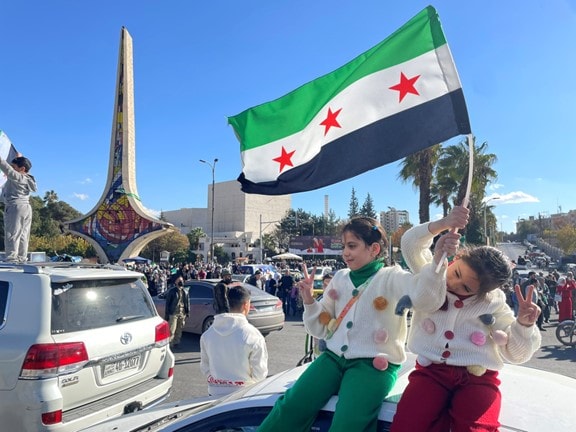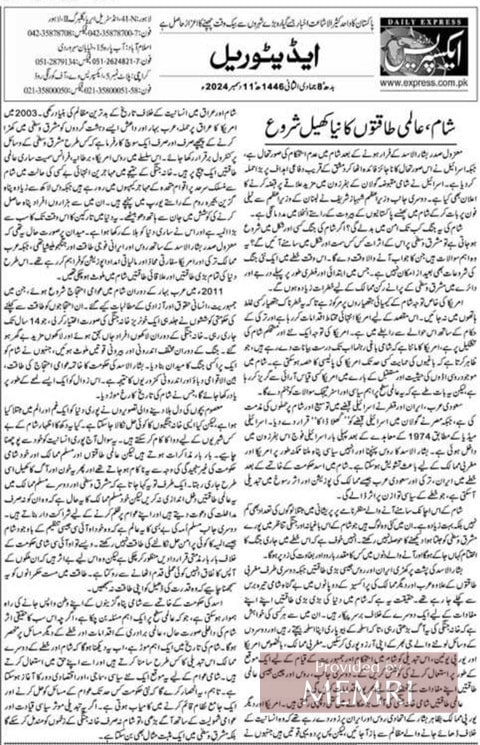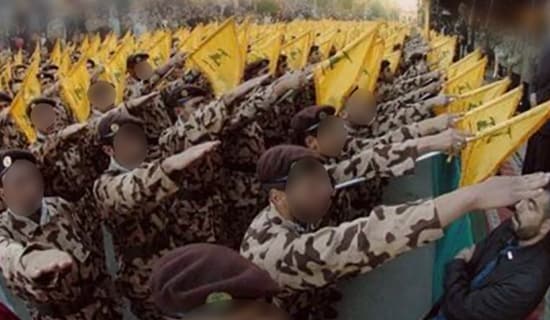In an editorial on the fall of the Bashar Al-Assad regime in Syria, Pakistan's leading Urdu-language daily Roznama Express voiced concern over the likely continuance of instability and civil war in Syria and said that Islamic Ummah is helpless in finding resolutions of tragedies like Syria.
"It is said that these international powers should not intervene in the Middle East and other Muslim countries. However, the situation of Muslim countries is such that they not only invite them for intervention but also make them participants in atrocities on their people," Roznama Express stated in its editorial titled "Syria – A New Game Of Global Powers Begins."
The editorial also noted: "The end of Assad's regime could pave the way for the Syrian refugees to return to their homeland, which has become an important issue at the international level. However, this will be dependent on real impact of Syria's internal situation, steps by the international community, and other regional problems."

Syrians celebrate the fall of Bashar Al-Assad (image: X)
Following is a translation of the editorial:[1]
"How Long Will It Take For This War In Syria To Turn Into Peace? If The War In Syria Starts In Another Form, Then In What Direction And Form Will Its Effects On The Middle East Appear?"
"Since the deposed President Bashar Al-Assad fled, Syria is in a state of instability, while Israel has taken immoral advantage of this situation to launch a major attack on defense targets near Damascus. Israel has also announced the capture of more territory in the buffer zone of the Syrian-occupied Golan. On the other hand, [Pakistani] Prime Minister Shehbaz Sharif has spoken to the Prime Minister of Lebanon on the phone and asked for help in evacuating Pakistanis stuck in Syria via Beirut.
"How long will it take for this war in Syria to turn into peace? If the war in Syria starts in another form, then in what direction and form will its effects on the Middle East appear? These are the important questions that the coming days will answer. At this time, the start of a new war in the region is not too unlikely in which initially and naturally the risks will be higher for the older states of the Middle East in the first tier and on the periphery.
"America's special attention is focused on Syria's chemical weapons so that these dangerous weapons do not fall into the wrong hands. For this purpose, the U.S. is taking very careful steps and is in contact with the Turkish authorities in this regard. With America's focus on building a new and stable Syria, the U.S. believes that the Syrian rebel leaders have been making the right statements so far, indicating that support for the rebels may be a part of U.S. policy. The U.S. is avoiding any speculation about the status and future of Russian bases in Syria, but it is sure to raise important political and strategic questions globally.
"Saudi Arabia, Iran, and Qatar have condemned the expansion of the Israeli occupation and the attacks on Syria, while Egypt declared the Israeli occupation in the Golan as 'open robbery.' According to Israeli media, the Israeli army has entered the buffer zone for the first time since the 1974 agreement. Bashar Al-Assad's arrival in Russia and his political asylum may be a cause of concern for the U.S. and Western countries. After the end of the Assad regime in Syria, there may be a change in the position and influence of countries like Iran, Turkey, and Saudi Arabia in the region, which will affect the political balance of the region.
"The number of people [i.e., Muslim leaders] who are worried about this scenario emerging suddenly in Syria is not small; rather it is very high. Among them are many people who cannot bear to see the entire Middle East burning in this context of the rebels and war in Syria. They are afraid of where the ongoing war in this region will end and whose fate will be faced with gunpowder and rebellion in the coming days."
"Western Countries, Especially The United States And The European Union, Will Try To Use This Change As An Opportunity To Establish Stability And Democracy In Syria"; "Russia And China Will Go To Great Lengths To Protect Their Interests"
"Big powers like Iran and Russia standing behind Bashar Al-Assad on the one hand, while on the other, the proxies of Arab and other countries, in addition to those of the West, have been crushing innocent Syrians for thirteen years... The fact is that the major powers of the world are fighting each other for their own interests in Syria. Each of them wishes that this fire of civil war will continue to grow, so that the arms dealers can sell their weapons, and the plunderers of others' natural resources can fulfill their desires fully.
"Western countries, especially the United States and the European Union, will try to use this change as an opportunity to establish stability and democracy in Syria. On the other hand, global powers such as Russia and China will go to great lengths to protect their interests. How interested are world powers in fuelling the Syrian civil war?
"America and other European countries, at the apparent level, were pressuring Bashar Al-Assad's allies Russia and Iran to desist from committing atrocities against humanity. However, behind the scenes, these are the powers that established the basis for history's worst crimes against humanity in Iraq and Syria. The only thought active behind the U.S. invasion of Iraq in 2003, the Arab Spring, and the Islamic State is how to control the resources of the Middle East.
"In this regard, all world powers, including Russia, America, Britain, France, are on the same page. As a result of the civil war, refugees are living in extreme destitution in UN refugee camps situated on the border with Syria, while more than a million refugees have arrived in Europe via the Mediterranean Sea. Thousands of them lost their lives seeking refuge.

A screenshot of the Roznama Express editorial
"This is the biggest migrant tragedy in the world so far and it has shaken the whole world. The situation on the ground was that the deposed President Bashar Al-Assad was accompanied by Russian and Iranian military power and armed militias, while the Arab countries, Turkey, and the United States were providing diplomatic fronts and financial support to the opposition. Thus, all major world powers and regional powers were involved in Syria.
"In 2011, during the Arab Spring, public protests erupted in Syria, demanding democracy, human rights, and freedom. The government quickly attempted to suppress these protests, turning the situation into a bloodbath. The unrest escalated into a civil war, lasting for 14 years, during which hundreds of thousands lost lives, and millions more were displaced. The war saw the involvement of various internal and international forces, which turned Syria into a battlefield of proxy war."
"The Helplessness Of The Muslim Ummah Is Such That It, Despite The Existence Of An Organization Like The Organization Of Islamic Cooperation, Does Not Have The Ability To Find A Peaceful Solution To Tragedies Like Syria"
"The end of the Bashar Al-Assad government is the result of the force of people's protests, international pressure, and internal weaknesses. This downfall will be remembered as a moment that changed the direction of Syria's history. The images of innocent children in distress have shaken the hearts of the entire world, raising the question of what has happened to humanity. However, is there any solution to such civil wars? Can expressions of sadness act as a medicine for the helpless civilians of Syria? These are the questions that the entire humanity must ask itself today.
"Talks happen frequently and fail due to the lack of seriousness of global powers, Muslim countries and the Syrian government itself. And then this war of fire and blood continues. On the one hand, it is said that these international powers should not intervene in the Middle East and other Muslim countries. However, the situation of Muslim countries is such that they not only invite them for intervention but also make them participants in atrocities on their people.
"On the other hand, the helplessness of the Muslim Ummah is such that it, despite the existence of an organization like the Organization of Islamic Cooperation cannot find a peaceful solution to tragedies like Syria. Although the OIC has repeatedly adopted resolutions condemning the Syrian government, those are ineffective because the enmity between these countries prevents them from taking a practical step. The rulers drunk on power should understand that destiny's leniency is not their power.
"The end of Assad's regime could pave the way for the Syrian refugees to return to their homeland, which has become an important issue at the international level. However, this will be dependent on the real impact of Syria's internal situation, steps by the international community, and other regional problems. Now is a critical turning point in Syria's history. It has yet to be seen how Syria and other countries of the region face the transformation and use it in their interests.
"This opportunity for the Syrian people can herald a new social, political, and economic era. However, this will be dependent on how far the new government succeeds in establishing a new comprehensive system and in resolving people's problems. If this transformation proceeds along with effective political leadership and people's participation, Syria can not only remove the scares of the civil war but also become a positive example for the Middle East."
[1] Roznama Express (Pakistan), December 11, 2024.





